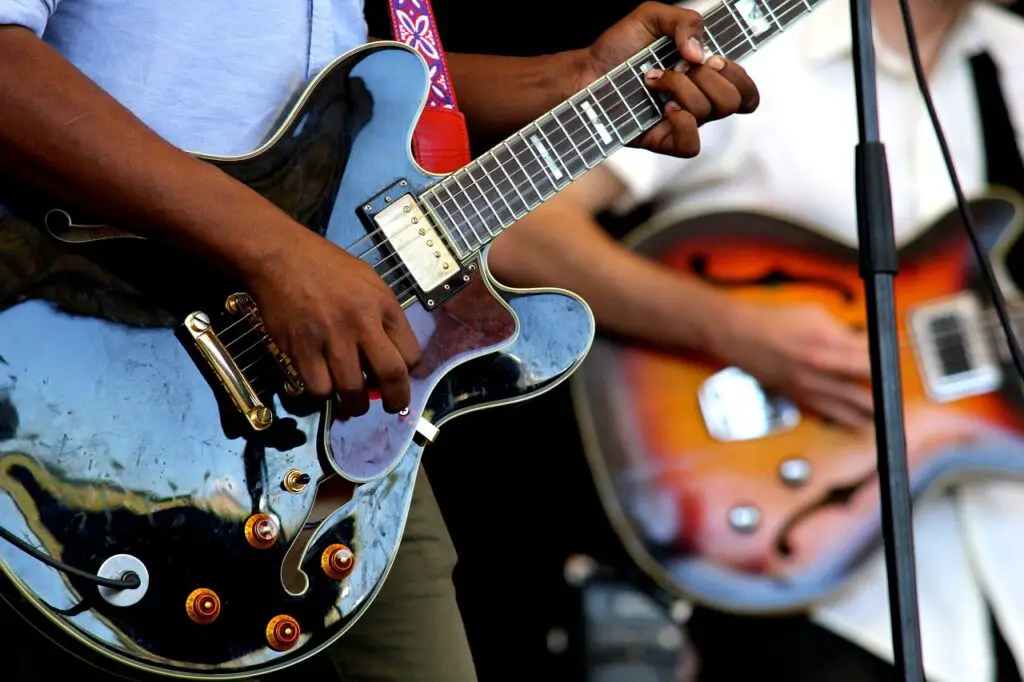Bass guitar picks are an indispensable tool for bassists, and the right size can significantly affect sound and playing experience.
Bass guitar picks typically measure 50-60mm wide, with 60mm being the standard size. However, some bassists prefer smaller pick sizes ranging from 50-55 mm for greater control and precision when playing.
When selecting an ideal pick size for a bass guitar, one must take into personal account preferences and playing style.
If using many fast-paced techniques on top, thinner picks may provide better flexibility and agility, while thicker ones would suit more aggressive players who require greater stability and control when hitting harder notes.
Standard Thickness for Guitar Picks
The thickness of a guitar pick is an important factor that affects its sound and playing experience.
Pick thickness is determined by weight or gauge; lighter picks tend to be preferred for rhythm and strumming, while thicker ones offer greater control for intricate playing techniques.
When selecting a pick, it is essential to ensure its thickness corresponds with the gauge of your strings.
Dimensions can usually be described through diameter, width, and length; additionally, the pick’s material may also influence its thickness.
The appropriate pick thickness is important in maintaining your playing’s tone and feel. When selecting a pick for your string gauge, thin is best as it won’t cause any tone or feel loss, and thicker is preferred for more intricate playing styles.
Therefore, consider your playing style and the gauge when selecting your pick; thin picks work best for strumming or rhythm playing, while thicker ones provide extra durability when doing intricate movements.
Differences Between Guitar Picks and Bass Picks
Guitar picks can still be used to play bass effectively but some guitarists find that using regular guitar picks when playing bass works just as well for them.
It all comes down to experimenting with different picks until you find one that best fits your style and preferences.
Bass picks typically measure 1.19mm long, while guitar picks only measure 0.035mm. Furthermore, bass picks tend to be larger and blunter than guitar picks, giving you better control over your strings for a wider, more rounded bass sound.
Contrastingly, guitar picks produce a thinner and sharper sound than bass picks. When selecting between these two instruments.
It’s essential to consider what style of music you are playing; in most cases, guitarist picks may not produce as pleasing an effect as wider and rounded sounds produced by bass picks.
Which Instrument Is Easier To Play, Bass Or Guitar, Specifically Regarding Slap Technique?
When learning fingerstyle, slap, and tapping techniques, the string bass may be simpler to pick up than the guitar.
The bass allows these techniques to be learned with less effort, making it easier to become proficient.
As a result, the slap bass technique has become a crucial skill in various genres of music, ranging from rock and metal to jazz and art music.
It may be easier to slap bass than guitar due to the instrument’s size and design.
Why Is Bass Superior To Guitar?
From a functional standpoint, the bass is superior if you enjoy creating grooves, holding down the rhythm, and staying in the pocket.
While the guitar can certainly do these things, it shines more brightly when playing chords, soloing, and experimenting with effects.
The guitar’s versatility and flashy nature make it better suited for creating a wide range of sounds and serving as a more expressive instrument.
However, if you prefer a supportive role in a band, the bass is an excellent choice due to its integral yet understated presence.
Ultimately, the choice between bass and guitar depends on personal preference and the specific musical role one wants to fulfil.
Is It Easy For A Guitarist To Learn How To Play Bass?
Transitioning from guitar to bass can be a relatively simple process due to the similarities between the two instruments.
Many of the techniques and skills used in guitar play also apply to bass playing.
Transitioning from guitar to bass can be a seamless process for many musicians due to the similarities between the instruments, such as frets, strings, and an identical tuning system.
Many guitarists find it simpler to learn bass than other instruments like drums or piano. However, it’s essential to note that playing bass requires a different approach and technique than playing the guitar.
Bass players must focus on creating a steady and reliable rhythm, serving as the backbone for the rest of the band.
This requires playing with an established groove and using fingerstyle or pick-playing techniques to produce a full, round sound.
Furthermore, bassists often collaborate closely with drummers to form an efficient rhythm section.
Should I Use A Heavy Or Light Pick For Bass?
The thickness of a pick comes down to personal preference and playing style.
Some bassists prefer thicker picks since they offer greater control and stability, while others favour thinner ones due to their greater flexibility and agility.
It is essential to remember that while the thickness of a pick can affect the sound and playing experience, it is not the only factor.
The material, shape, and player technique all play an important role in producing desired sounds.
When selecting a pick for playing bass, the ideal approach is to experiment with various sizes and materials until you find what works best for your style.
Combining pick thicknesses can be beneficial when employing various playing styles and techniques
Thicker picks are more suitable when playing fast-paced, intricate basslines, while thinner ones work best when strumming or rhythm.
Which Is Better For Bass In Metal Music: Pick Or Fingers?
When playing bass in metal music, creating a well-rounded tone that blends in with the guitars and other instruments is important.
Although using a pick can provide an aggressive sound that cuts through the mix, there may be more suitable approaches for bassists in this genre.
Relying solely on your pick can cause your sound to be turned down or mixed out entirely. Cutting sounds often clash with other instruments in a mix, creating an unbalanced and unpleasant listening experience.
Conversely, using your fingers to play bass in metal music can produce a smoother and more round tone that’s easier to EQ and blend with guitars.
This allows you to be heard clearly within the mix without overpowering or clashing with other instruments.





